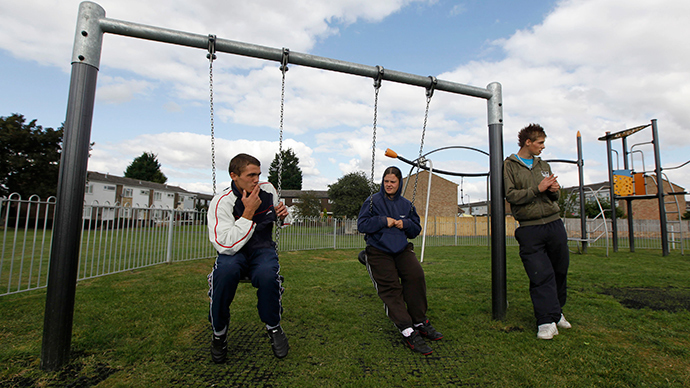Forgotten ones: 50,000+ young people jobless and undocumented by UK govt

Over 50,000 young Britons aged between 16 and 18 are devoid of education, employment or training, and are undocumented by local authorities. They are effectively being failed by the state, a new report reveals.
The report, ‘Out of Sight’, warns that Britain’s crisis of NEETs – young people who are not in employment, education or training – is far more serious than local authorities realize because tens of thousands of them have simply “disappeared off the radar.”
In London, a startling 15,000 of these youngsters are no longer accounted for on public records, the research indicates.
The report’s author, Richard Brooks, carried out the research on behalf of the Fabian Society – a socialist think tank affiliated with the Labour Party.
Formerly a senior policy adviser to the Secretary of State for Children, Schools and Families, Brooks is also the author and project director for multiple publications on welfare, public services and education.
‘Out of Sight’ warns the quality of regional data on Britain’s NEETs has been severely eroded since the current coalition came to power.
The scale of this catastrophe is massively understated, particularly by local authorities, the research suggests. The result, Brooks warns, is that thousands of unemployed youngsters across the state are facing a serious predicament – on a limb, lacking education or training and deprived of the state support they so desperately require.
Brooks says the predicament of being NEET has “very serious consequences” for young people.
“At the ages of 16 and 17 it means missing education, and at the age of 18 it means being unemployed,” he says.
This combination can spark a downward spiral of long-term joblessness, poverty and ill health, Brooks emphasizes.
NEETs often gravitate towards “early single parenthood and the iniquitous cycle of inherited disadvantage,” he stresses.
Although this socio-political problem has fallen off the government’s policy agenda, it remains a serious crisis. The Fabian Society’s report reveals 12.5 percent of 18 year olds in England were NEETs last year, and the rate was far higher in certain English urban centers. In 2013 alone, more than 80,000 young Britons became jobless.
Brooks states that the problem is huge, and has serious socio-economic consequences. He argues in his report that the political establishment and society at large are failing these young people because they are often deemed simply “too hard to help.” Confusion relating to the group’s statistical documentation compounds matters.

‘Out of Sight’ acknowledges that growing numbers of youngsters are staying in education after their GCSEs (school-leaving exams) and the overall number of 16- to 18-year-old NEETs in Britain appears to be in decline. But it warns this apparently benign scenario is deceptive.
“The number of young people who are NEET doubles between the ages of 17 and 18 and, ultimately, what really matters is how many young people end up unemployed or in low skill, insecure jobs,” Brooks says.
Understated crisis
More alarmingly, Britain’s official NEET numbers “grossly understate the scale of the problem at local level,” he cautions.
“We have lost track of tens of thousands of young people, including over 50,000 NEETs across England,” Brooks says.
The result is that this vulnerable group remains isolated, and fails to receive the help the young people require on an individual level. Equally, they are not prioritized by policy-makers or government officials.
Brooks says a fundamental shift in the way NEETs are viewed is essential if tangible progress is to be made. Many misconceptions regarding this group are rife and must be addressed, he argues.
While NEETs are commonly understood to be marginalized, troubled and in some cases dangerous, most are not, the report reveals. Many pursue further education, and most do not come from poor families or have special educational requirements. Equally, few have criminal pasts.
Rather, NEETs are generally characterized by a lack of key qualifications and skills, particularly in mathematics and English. Such skills are vital to secure and sustainable employment, according to Brooks.
“The key to really reducing NEET numbers lies in ensuring that many more young people develop their core skills and qualifications,” he says.
“Most importantly, this means dramatically improving literacy and numeracy through the education system.”

Continued cuts
‘Out of Sight’ was co-funded by Impetus-PEF, a private equity foundation.
Echoing Brooks’ perspective, Jenny North, director of policy and strategy at the organization, told the Independent that “educational attainment is the key to employment.”
“Our educational system, both pre- and post-16, is failing more people than we realized,” she added.
Figures relating to NEETs were formerly collected at a local level by Connexions, an advice service for young Britons. But the government terminated the body’s previously ring-fenced grant, leaving councils to gather the statistics with paltry resources.
A spokesman for the Local Government Association told the Independent that councils want to assist every young person in the state in realizing their potential, but emphasized local governments urgently require “more legal powers” to ensure they can fulfill this goal.
Such enhanced legislative powers would enable local authorities to “ensure partners [including UCAS] share vital information as quickly as possible,” he said.
He also suggested the devolution of “all national youth schemes to local areas” would considerably help matters and further enable “councils to meet their duties to young people.”
Parliamentary Under-Secretary at the Department for Communities and Local Government Kris Hopkins announced on Thursday that English councils will face further cuts of 1.8 percent to their funding in 2015-16.
The Local Government Association told the BBC council services would “buckle under the strain” of further cuts.












